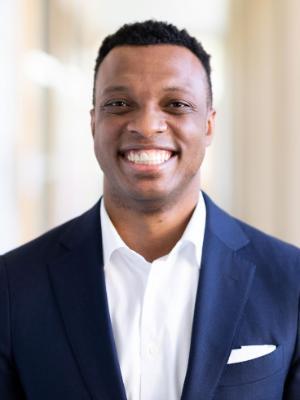November 16, 2020
As a Civil Society Fellow, Hill will grow as a leader while helping his local community.
 When Dr. Theon Hill was nominated for the Civil Society Fellowship, the idea of getting to travel the globe to connect and collaborate with others was just one of the factors that intrigued him. “It’s going to be a different way of engaging the themes that I normally teach, an opportunity that I found attractive,” said Hill, an Associate Professor of Communication at Wheaton College. “It’s an opportunity to apply theory in practical ways to positively impact local communities.”
When Dr. Theon Hill was nominated for the Civil Society Fellowship, the idea of getting to travel the globe to connect and collaborate with others was just one of the factors that intrigued him. “It’s going to be a different way of engaging the themes that I normally teach, an opportunity that I found attractive,” said Hill, an Associate Professor of Communication at Wheaton College. “It’s an opportunity to apply theory in practical ways to positively impact local communities.”
Hill joins a cohort of 20 other scholars, leaders, and thinkers as part of the Aspen Institute’s Civil Society Fellowship program. Hill will spend the next two years growing as a leader while also developing a community-based venture to create change in the Chicago community.
The Aspen Institute, based in Washington, D.C., was created in 1949 as a place for thinkers, leaders, scholars, and artists to converge in a nonpartisan space to elicit change in their communities. Today, it still fulfills that mission by acting as an educational and policy studies organization.
“The Aspen Institute approaches problems from a nonpartisan perspective,” said Hill. “In this moment of deep political polarization, I think it’s important for Christians to engage across lines of difference, to engage with people who may or may not agree with them as a means of accomplishing change. Broad-based cooperation offers the chance of making a difference in society.”
The hope of the institute and the Civil Society Fellowship is to encourage leaders to deal with critical issues in collaborative ways, an especially important perspective this year.
“Dr. Hill competed successfully for this prestigious fellowship at the Aspen Institute, which empowers its fellows to lead American communities towards improving cohesion and civic engagement. This is an exciting opportunity for Dr. Hill to interact with a diverse network of leaders to further Wheaton's mission of building up the church and society, and our students, educating the whole person,” said Wheaton College Provost Karen Lee.
As an Associate Professor of Communication, Hill operates at the cross-section of race, politics, and faith. Although these are themes that Hill typically researches, teaches, and writes about, the fellowship will allow him to engage with these ideas in a new way by working on a community-based venture project. In between leadership seminars in various cities across the globe, he anticipates working with minority business owners in Aurora (where he lives) and the broader Chicagoland region. “My goal is to partner with local businesses to enhance their visibility, market share, and investment from government and the broader community,” he explained.
Hill points out that minority-led businesses, especially those in underserved communities, often face neglect and limited support when public contracts and government subsidies are distributed. “Part of my venture will be to explore opportunities to build up the economic infrastructure of underserved, racialized communities. Any pursuit of racial equality depends on economic justice. I’m interested in working with local businesses as means of strengthening underserved communities that often go unnoticed in the broader public sphere,” says Hill.
In addition to this project that will hopefully help historically marginalized communities, Hill is entering his fellowship with two other goals in mind. He sees the cohort experience as a unique opportunity for personal formation. “I want to learn from people from different backgrounds who agree with or disagree with me and see how that dialogue enriches me,” he explained.
He also wants to take this fellowship experience and understand what it means to be a leader within the community—and the classroom.
“I think leadership is an understated and underappreciated role of the academic,” said Hill. By having to translate his work into “meaningful and concrete” strategies of community development, Hill hopes to gain insight into ways of bridging the gap of theory and practice for his students in the classroom.
“That process of being able to translate my work will empower me to develop educational opportunities for my students to learn what it means to reflect the God of justice in their local communities.” -- Alexandra Shimalla